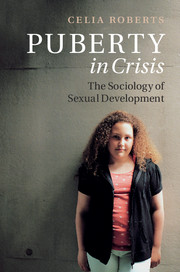Book contents
- Frontmatter
- Dedication
- Contents
- List of figures
- Acknowledgements
- 1 Puberty in crisis? Sex, reproduction and the loss of future
- 2 Articulating findings, feelings and figurations: methods and approaches
- 3 Telling histories: the scientific study of puberty
- 4 Defining early onset puberty: troubling findings about sexual development
- 5 Causes and explanations: genes, fat, toxins and families
- 6 Consequences of early development: sex, drugs and shortness
- 7 Treatments: pharmaceuticals, sex and suffering
- Conclusion: Folding puberty differently: changing findings, feeling and figurations
- References
- Index
4 - Defining early onset puberty: troubling findings about sexual development
Published online by Cambridge University Press: 05 August 2015
- Frontmatter
- Dedication
- Contents
- List of figures
- Acknowledgements
- 1 Puberty in crisis? Sex, reproduction and the loss of future
- 2 Articulating findings, feelings and figurations: methods and approaches
- 3 Telling histories: the scientific study of puberty
- 4 Defining early onset puberty: troubling findings about sexual development
- 5 Causes and explanations: genes, fat, toxins and families
- 6 Consequences of early development: sex, drugs and shortness
- 7 Treatments: pharmaceuticals, sex and suffering
- Conclusion: Folding puberty differently: changing findings, feeling and figurations
- References
- Index
Summary
Puberty has been lavishly described within twentieth- and twenty-first-century science and biomedicine. As shown in the previous chapter, children's progress through the multiple and uneven physical ‘stages’ of development has been articulated in meticulous detail in texts that flow outside the traditional boundaries of science and medicine, becoming widely available in some forms for use by parents, teachers and young people. The hormonal cascades associated with puberty have also been intensely researched for almost a century, with an increasing emphasis in recent decades on connections between the brain, the central nervous system and the reproductive organs. Here, technical discourses are less certain: in many ways the ‘interior’ (endocrinological, neuroendocrinological and genetic) micro-processes of puberty remain a ‘mystery’ for contemporary scientists. Indeed, the 125th Anniversary special issue of the journal Science listed ‘What triggers puberty?’ as one of the top yet-to-be-answered 125 scientific questions for the twenty-first century (Anon. 2005). Much recent research focuses on genetic pathways in sexual development and gene–hormone–environment interactions in trying, as expressed in the Science article, to find out ‘what exactly forces childhood to end’ (Anon. 2005).
This chapter explores the scientific and clinical literature on early sexual development, focusing on technoscientific and biomedical research papers published in the leading journals forming the core of the mainstream debates. These papers were located through repeated searches of relevant databases and following citational trails, tracking the ‘life’ of particular datasets and arguments both in scientific publications and in more public domains. Attempting to come to grips with this lively field here, I trace key scientific publications through their description in press releases cited by journalists, social scientists and interested commercial and political actors.
Inspired by Kelty and Landecker's (2009) ethnographic approach to studying scientific literatures, I explore several phenomena. Firstly, I focus on the methods, findings and framing arguments presented in the scientific papers: what kinds of findings are articulated here and how are these made? What kinds of stories are told about puberty? (In later chapters I focus on what kind of problem puberty is said to constitute and what solutions are offered in biomedical and techno-scientific literatures.) Secondly, I follow the citational chains linking key papers, asking how scientists create debate around early puberty through citing or refuting each other's work.
- Type
- Chapter
- Information
- Puberty in CrisisThe Sociology of Early Sexual Development, pp. 91 - 127Publisher: Cambridge University PressPrint publication year: 2015



